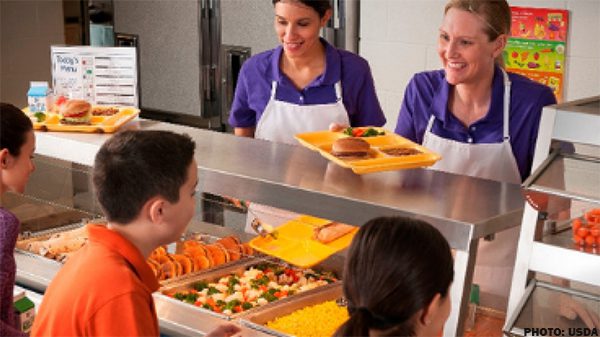WASHINGTON, Jan. 7, 2022 – U.S. Department of Agriculture (USDA) Secretary Tom Vilsack today announced an adjustment in school meal reimbursements to help schools continue to serve children healthy and nutritious meals.
This move will put an estimated $750 million more into school meal programs across the nation this year, making sure federal reimbursements keep pace with food and operational costs, while ensuring children continue to receive healthy meals at school.
“USDA understands that balancing the pressures of the pandemic with the need to feed children healthy and nutritious meals continue to be a priority for schools across the country,” said Agriculture Secretary Tom Vilsack.
“The Biden-Harris Administration is doing everything we can and these higher meal reimbursements will help allow school meal programs to continue meeting their mission of giving children the nourishment they need to grow, learn, and thrive.”
School lunch reimbursement rates usually do not increase during the school year. However, this year, due to the pandemic, USDA allowed schools to benefit from the highest rates available, which are normally reserved for the USDA Summer Food Service Program (SFSP). By law, these summer rates adjust for inflation annually in January.
This adjustment is well-timed to ensure the purchasing power of schools keeps pace with the cost of living. Schools receiving these reimbursement rates can stretch their operating budgets further during these tough times, while giving families fewer meal expenses to worry about each school day.
At the start of the 2021-2022 school year, the SFSP lunch reimbursement rate for participating schools was already 15% higher than the standard reimbursement for a free lunch. Now, because of higher food costs and other circumstances, schools will receive an additional 25 cents per lunch. Taken together, schools are receiving 22% more for school lunches than they would under normal conditions.
This action is part of USDA and the Biden-Harris Administration’s joint effort to ensure school meal programs are strong and have the assistance they need to navigate current challenges. This year’s upward adjustment will add to the range of flexibilities, resources and hands-on support USDA has provided to school meals, which has included:
• Providing $1 billion for schools to buy food for their meal programs and another $300 million for states to purchase 100% American-grown foods to be distributed to schools;
• Awarding up to $200 million to states for purchases of domestic local foods for distribution to schools, through the new Local Food for Schools Cooperative Agreement Program;
• Ensuring schools are not penalized if they cannot meet meal standards due to supply chain issues;
• Issuing and extending 14 nationwide waivers that allowed schools to run more flexible meal programs and serve free meals to all students, including relaxing meal pattern requirements, allowing parent/guardian pick-up of meals, and permitting meal service outside of the typically required group settings and meal times;
• Reimbursing local child nutrition program operators for emergency operating costs during the early months of the pandemic due to COVID-19 related restrictions and closures;
• Publishing new educational resources to help schools plan and serve meals, including a new set centered around the theme of Planning for a Dynamic School Environment, aimed at helping schools leverage current flexibilities;
• Ensuring schools and their partners understand complementary options for feeding children both in and out-of-school, such as the Child and Adult Care Food Program’s (CACFP) At-Risk Afterschool Program and “grab ‘n’ go” meals for children during remote or hybrid learning, student quarantines, and school closures; and
• Providing Pandemic EBT benefits to children attending schools participating in the National School Lunch Program (NSLP) via virtual learning or a hybrid model.
For more information about SFSP, visit: www.fns.usda.gov/sfsp/summer-food-service-program
To see state-by-state reimbursement rates, visit: www.fns.usda.gov/cn/total-amount-support-to-school-districts
More information on USDA’s response to COVID-19 can be found at www.fns.usda.gov/coronavirus
USDA touches the lives of all Americans each day in so many positive ways. In the Biden-Harris Administration, USDA is transforming America’s food system with a greater focus on more resilient local and regional food production, fairer markets for all producers, ensuring access to safe, healthy, and nutritious food in all communities, building new markets and streams of income for farmers and producers using climate smart food and forestry practices, making historic investments in infrastructure and clean energy capabilities in rural America, and committing to equity across the Department by removing systemic barriers and building a workforce more representative of America. To learn more, visit www.usda.gov.



